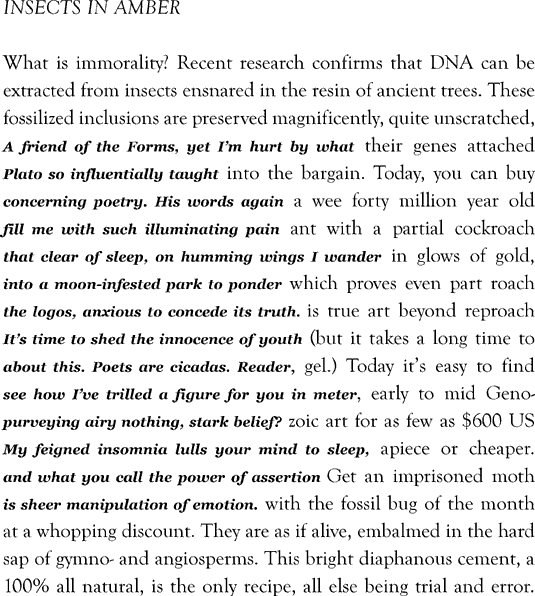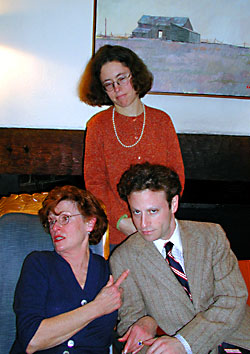There are certainties that will reach you soon,
which are seldom evident from the start.
Meanwhile semi-meanderingly Boston
flows like magic into the empty heart,
lends a vacant hand. Frost bites off, glues on
fingernails on the bronze of giants
while a local bank shuts off with a block
the accounts of delinquent clients.
Cars advance. There is nothing to stem the flow
of pedestrian stars and celestial eyes.
Simply follow suit through a neon glow
over glaring blackenings of the ice,
but be careful just as you are alone.
An experience nothing can beat will pass,
milling neon bone to neon dust,
sweeping neon pearls through dusk neon.
Christmas nears with a vengeance: its jingling bell
like a tinkling lily in gelid fluff
overhangs the premises where they sell
alcoholic beverages and stuff.
Quickened social life as a form of art
lets all things drop into a woven waltz.
Feeling sorry for tramps and bums, the heart
is again recounting its idiot pulse
and advancing into the crowd. ‘Go home,’
whisper cabs in their yellow checkered fuss.
Early Santa, his whiskers suffused with rum,
whispers softly, whispers, and whispers thus:
‘Everything impels one to reaffirm
that inevitably there comes a time
when it’s time to tighten your grip on life
in a grim suspension of disbelief.’
This is fine, classic stuff, not unworthy of some of the finest lyrics of Eliot or Hart Crane, yet eloquently contemporary and individual. It is written in direct yet suggestive language. Nikolayev is constantly in subtle ways, suggestive phrasings, putting details into a magnified context, subjecting them to a wide reflection. His deft control of idiom and intonation, his masterful manipulation of mood, and the strong undercurrent of some urgent tom-tom beat of meaning perpetrate their attack upon the emotions, where the poem takes up its residence as a kind of time bomb of meaning.
The end of ‘Certainties’ passes judgment on its beginning. These ‘certainties that will not reach you soon’ are not the certainties of philosophical truth, they are the certainties of necessity brought about by the exigencies of life. They are the certainties of a requisite ‘grim suspension of disbelief.’ Disbelief may be a more appropriate philosophical position toward ‘reality,’ but it simply will not cut ice with living in the world. It is not by ‘certainty,’ but ‘certainties’ — different or various certainties — that survival will be met. Nikolayev’s articulate hold on such certainties and uncertainties is of a very high order of synthesis throughout the poem. He renames in lucid, gelid detail just the ‘semi-meandering’ fiction which is typical of the stuff of life. His language and that fiction have an interlocking grip on each other, as they try to fight it out as to which one is real. Nikolayev is not questioning our belief in God, he is questioning (perhaps more relevantly) our belief in Massachusetts.
At every turn Nikolayev is making himself, language and us anew. Throughout Monkey Time he displays an enormous variety of approaches, modes and moods. The book is filled with astonishing performances, with strange and delightful oddities.
There is a found sonnet — Nikolayev’s eye has spotted a 14-line traditionally rhymed sonnet lurking in the text of a label on a can of aerosol (this projects us directly into the poet’s state of mind). At the extreme of his avant gardism the traditional is not absent.
As I have suggested, there are some wildly funny poems in this book. As humor often has to do with a multiplicity of meanings which undermine, show up, or expand upon the conventional meanings they reference, in poetry this can be a reflection of the poet questioning the ‘known,’ the ‘supposed’ — putting his faith in nothing less tangible than his own instincts. At times this amounts to a kind of ‘pure poetry’ or ‘pure lyricism.’ Another gloss on the sources of the poetic faculty? Listen to the closing stanzas of ‘Agnosticism’:
Ahoy, tell me, boy,
who was Frida Kahlo?
Wish I knew, but dunno.
To pretend seems callow.
I have found in Central Park
the remains of Noah’s Ark.
But I ask you, who is Noah?
I admit that I dunno.
‘Y’all so yellow, hollow winds,’
I’ll trill a capella.
Oh la la, why so, how so?
I decidedly dunno.
Buddy, ask me something.
Ask me anything.
For instance, is this my
tuxedo. Dunno, why?
Nikolayev is also the master of an oblique, sly humor that gets its kick from a kind of distortion of tone. In ‘Mr. God:’ a cartoon-like narrator’s voice, in a loaded admixture of high and low speech, somewhat kin to the broad tradition of American humor which has one of its exemplars in W. C. Fields, addresses God:
... Small, medium or large
sprite, coke on tap or bottled pepsi? Gotcha.
I much enjoy work out in paradise.
They pay me well up here. The tips are large.
But mister, how about lettin me watch ya
transform them academics into mice?
There are two extremely hilarious parodies of Robert Frost, both sonnets (‘Frost Reminisces on Doing Farming Just North of Boston,’ ‘Frost Interviewed by The Boston Farmer’), where an apparent or slyly overt criticism of Frost does not override the hilarity of delight the author evidently finds in mimicking and even one-upping Frost’s style, with I daresay some of the ginger prickly independence of Frost himself.
Some of the poems are just plain fun. In ‘A Cable to Hawaii,’ Nikolayev invites us to ‘inhale topless tulips’ and ‘hele with the muumuus to the luau.’ He displays his serene mastery of the silly pun (and the absurdity or beauty of propositions) in ‘A Visceral Yes’ when he says: ‘Think of all the things a noncom can do to a private.’
Everywhere in the book Nikolayev is exploring the limits of what poetry is. Nikolayev’s ‘experimentalism’ — or the ‘experimental’ aspect of the poems in this collection — is akin to the formalism of Ashbery when he is at his best — he is liable to do anything with his technique, but it is always in the service of a precise formal cogency. There are poems in the book which begin in a disjunctive, avant garde mode, but by a deft turning of the lens become more and more focused until the disjunctive elements inform and are informed by what turns out to be a rational lyrical discourse and a definition of art. In ‘Taboo,’ Nikolayev says a very great deal about what can’t be said in poetry:
things you can’t mention are the insects
leaves of any kind of flora moral
also all the meta words like sense
trash grandparent non referent aberration
like electrocution of the invisible
broke cameraman cataclysms of the earth
imagine being born into him or her
oh and course I forgotten the snow
noshing these things trivialize everything
make you bank make you crank out nothing
2 bit sonnets on a tea afternoon
blokes laughing you in like
all those words are too regional
s well as other things you can’t mention
haven’t done itsy bitsy rock sunset
oldsmobile have no complaint
experience forget experience
the butterfly is a flying sandwich of pollen
the typewriter a typing sandwich of lying
of trying to speak the truth in language
snapdragons on the lawns
display their leonine yawns
the mind’s verandah is clear
with its gardens of slats 2 silken
armchairs 2 bitter sockets of hope
doily what a flat woven pattern of
what you can’t recognize can’t mention
these things too are taboo in poetry
The disjunctive texture of some of the language must be taken as an inclusive assessment of the disjunctive aspects of experience or reality in relation to the poem’s consideration of the taboo in poetry. Suppression and substitution can say a lot. As Nikolayev puts it at the end of ‘A Polemic’: ‘do you copy again subvert subvert / and still meaning shines through / subvert it and still it shines through / that’s the magic.’
It would be impossible for me to recommend this book highly enough, so singular and exemplary an intelligence is reflected and radiated in its linguistic invention, in its sweeping critical world view. Nikolayev is reviving not only classical, formal methods, but their old, original accompanying assumption that poetry should be visceral, and concerned with matters of importance, and he is combining these with an utterly wild and yet perspicacious, meaningful, contemporary experimentalism. In doing so, he demonstrates quite coherently and cogently that genuine lyric poetry is far from dead, that it is inventive and individual as it ever was. It would be a shame if Monkey Time were lost among the shuffle of new poetry books being published, and did not reach the exuberant celebration of the wide readership it deserves. These are poems that are riveting for the immediacy and urgency of a language that draws deeply upon the springs of language, while inventing new idioms to make us feel the world that we live in. They are full of lines ‘that cause tears to flow / and cheers to follow’ (‘Boxes’). Throughout, Nikolayev is relentlessly resourceful, finding ways to, in Eliot’s famous words, ‘dance / Like a dancing bear, / Cry like a parrot, chatter like an ape.’ The message is urgent. It is possible to be fully alive. This is poetry with ears.
|


